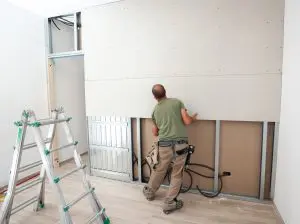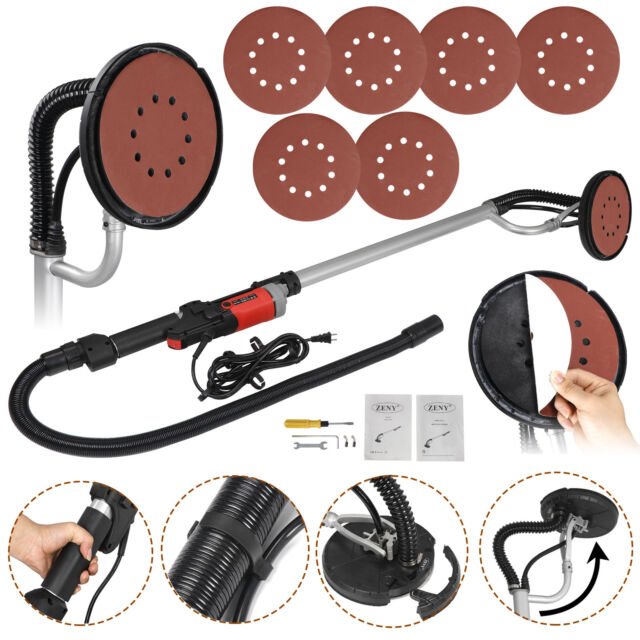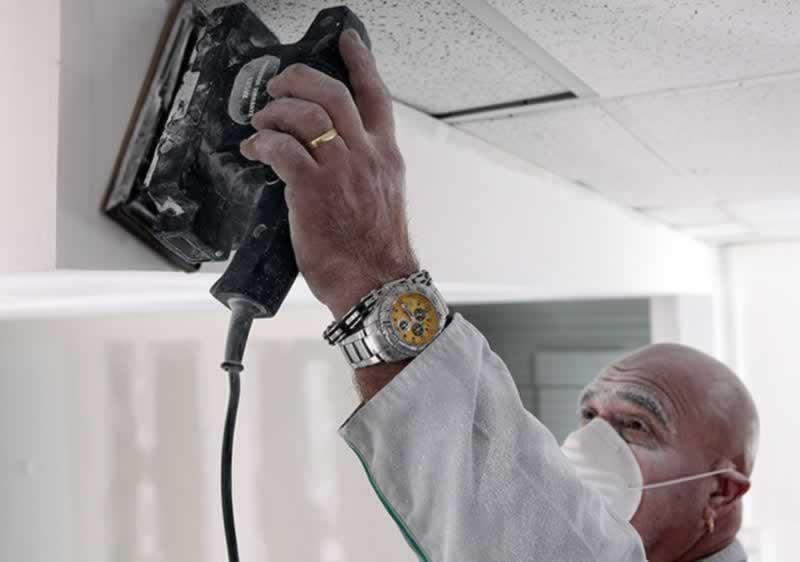
A great way to change the look and feel of a room is to install tile on drywall. It's crucial to prepare the drywall before you start to ensure that it adheres properly to the wall.
Depending on the type and condition of your drywall, you might need to paint it or prime it before you start tiling. This will make the drywall easier to work with and prevent any imperfections from developing. It also helps to smooth out any rough edges so the tile will have a better grip on the wall when it is installed.
You can hang tiles on drywall by applying thin-set mortar, then tile over it. It is possible to make this process difficult so it is a good idea to hire a professional.
Before you begin, remove any old tiles and clean the wall with TSP (tri-sodium phosphate). This will enable the adhesive to bond with the drywall, and help ensure a strong connection between the tile & wall.

If you have painted drywall, remove the old paint with a scraper and clean it with TSP before tiling. Sand the surface with sandpaper until it is smooth.
After cleaning and drying the drywall apply a coat of joint compound/mud. This will seal the drywall, protect it from moisture, and dust. Once the compound has dried, you can start tiling.
Next, snap perpendicular chalk lines along the floor and wall to divide the room into quadrants. This will make the tiling process easier and provide an estimate of how long each area will take.
To align the tiling area to the midline created in Step 3, use a wooden batten board. This will ensure your tiles remain straight while you are working, as well as allowing you to trim or cut them at a later stage.
You'll also need a tiling trowel, which has notches on one of its long sides to dig grooves into the thin-set mortar so it flattens as you press it into the wall. Apply the mortar to the wall with a sweeping motion.

You'll need pre-laying the stones to make sure they are flush against the wall if you plan on installing stone wall tiles. This will help determine the best layout of your tile and make installation easier.
Place the stones on a flat surface. Pay attention to their size and color. This will ensure you have an even mix of colors throughout the whole installation.
To tile marble tiles on drywall, you'll need to mix thinset that will help the marble to stick to the drywall. Mix two cups of water and half a bucket powdered thinset. Add more water to make a mix that sticks to the wall, but is not too thick to cause them to fall off.
FAQ
Do I require permits to renovate a house?
Yes. You will need permits to start any home renovation project. In most cases you will need to have a building permit along with a plumber's permit. A zoning permit may be required depending on what type of construction you are doing.
Is it better to remodel an older house than build a brand new one?
If you're thinking about building a new home, there are two options for you. One option is to buy a pre-built home. This type of home can be moved in to immediately after it is built. Another option is to build a custom home yourself. If you choose this option, you will need to hire someone to help you design your dream home.
How much time and effort you put into designing and planning your new home will determine the cost. You'll probably need to do the majority of the construction work yourself if you build a custom home. This will require more effort. However, you have more control over what materials you use and where they are placed. It might be easier to find a contractor that specializes in custom-built homes.
A new home is typically more expensive than one that has been renovated. Because you will need to pay more money for the land and any improvements made to the property, this is why a new home is usually more expensive. Plus, you'll need to pay for permits and inspections. The price difference between a newly built and remodeled home averages $10,000-$20,000.
What should I look for when buying a home?
Before purchasing a new home, make sure that you have enough money saved up to cover closing costs. Refinancing your loan is an option if cash is tight.
How do I start a renovation of a house?
Cleaning out clutter inside and out is the first step to fixing up a house. Next, you will need to eliminate mold, repair or replace any damaged walls, repaint your entire interior, and fix any leaky pipes. Finally, you need to clean off the exterior surfaces and apply fresh paint.
Statistics
- Rather, allot 10% to 15% for a contingency fund to pay for unexpected construction issues. (kiplinger.com)
- It is advisable, however, to have a contingency of 10–20 per cent to allow for the unexpected expenses that can arise when renovating older homes. (realhomes.com)
- On jumbo loans of more than $636,150, you'll be able to borrow up to 80% of the home's completed value. (kiplinger.com)
- The average fixed rate for a home-equity loan was recently 5.27%, and the average variable rate for a HELOC was 5.49%, according to Bankrate.com. (kiplinger.com)
- Most lenders will lend you up to 75% or 80% of the appraised value of your home, but some will go higher. (kiplinger.com)
External Links
How To
5 Things to Know Before You Start Your Home Renovation
-
Do you really want this? It's likely that you will need assistance if you plan to tackle a large home improvement project, such as remodeling your kitchen or bathroom or building a new home. If you aren't confident enough to take on such a daunting task, you may want to reconsider. This could cost you a lot of money and time, and you may not get any real benefit from it. Instead, hire someone who has experience in this field to assist you. You'll be able to save a lot of time and stress while still having a lovely space to call your own.
-
How much should a project cost? This is a common question, but it can make renovations more expensive. The reason is because you'll probably find yourself having to pay back most of the costs at the end of the day. Stick to your budget if you have one! Without it, you may end up paying a lot but not getting anything back.
-
Should I hire professional tradespeople or DIY? - Although there's no right answer, we would recommend hiring professionals if you have the means. They can give you sound advice about how to proceed with your project. They can install the plumbing correctly and make sure that it is done safely. DIY projects require lots of trial and errors, which can mean you'll have many lessons to learn. You'll also have to deal with any problems that may arise throughout the process.
-
How much can I afford it? - Don't underestimate the cost of a renovation project. Even if you believe you can handle it yourself, it might be necessary to borrow money from your family or friends just to cover the costs. When you want to sell your existing property quickly after the renovations are complete, you will need to account for the price of selling it.
-
Where should I begin? - When it comes to choosing where to start, there's no right or wrong place. We recommend that you pick something that you are passionate about. It will motivate you to work harder and reduce procrastination. Also, try to avoid places that require a lot of maintenance. You shouldn't redecorate your living space if you are constantly cleaning up dirt and dust.